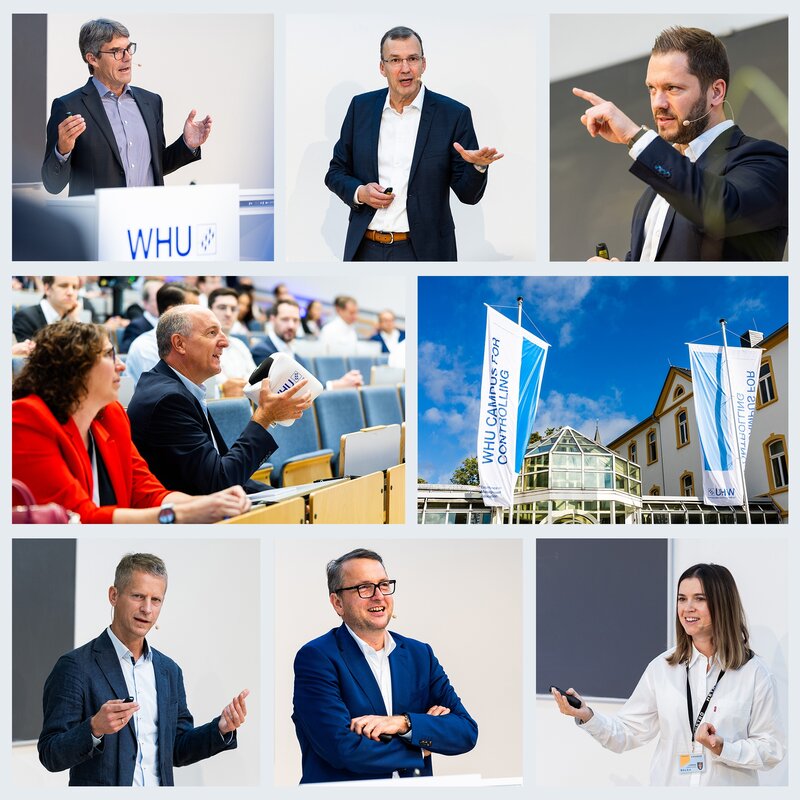WHU’s Institute for Management and Controlling welcomes over 140 guests to Vallendar campus
On September 5, 2025, the Institute for Management and Controlling (IMC) at WHU – Otto Beisheim School of Management welcomed 140 guests to the Vallendar campus for the 19th WHU Campus for Controlling. Under the direction of Professor Marko Reimer and Professor Utz Schäffer, the IMC hosted keynote speeches from CFOs and Heads of Controlling , who shared their best practices and invaluable insights with the community. The International Association of Controllers and the scientific journal Controlling & Management Review acted once again as partners for this year’s event. Following a dinner shared between participating financial experts, CFOs, and other controllers on the eve of the event, Professor Schäffer and Professor Reimer officially opened the conference that Friday morning.
“We all have to factor in moments of disruption,” emphasized Professor Reimer, noting the significant changes that the field of controlling faces today. And it was, alongside Professor Schäffer, Dr. Lars Grünert, Hartmut Mochel, Ilja Döring, Thomas Ried, and Viktoriia Vinokurova, this year’s keynote speakers, who shared their solutions-oriented approaches to cope with such disruption.
Future Controller Roles and Competencies – Professor Utz Schäffer
Professor Schäffer, in the first presentation of the day, summarized the results of the new WHU Delphi study regarding current and future roles and competencies of controllers. In practice, there are ten possible roles to consider: scorekeeper, guardian, business partner, service expert, functional expert, change agent, data scientist, decision scientist, data engineer, and data steward. He identified 42 different competencies split across six fields that active controllers must have, placing particular emphasis on personal responsibility. At the conclusion of his presentation, Professor Schäffer stated that a company’s controller should act as “the primate of scientific thinking”—that is, the critical counterpart to the manager. From his point of view, this is a journey that will continue and must therefore become more visible in practice.
Cost Management and Restructuring at TRUMPF – Dr. Lars Grünert
Dr. Lars Grünert, CFO and Management Board Member of TRUMPF, provided insights into how the company, as an independent family-owned firm, achieves its financial goals through cost management—despite international competition. As such, the company has identified four KPIs: the development of order intake, EBIT, value contribution/target fulfillment, and net financial position. “Whenever anomalies arise within these KPIs, when things are otherwise ‘status quo,’ we work with scenarios to determine what our savings targets should be,” noted Dr. Grünert. The starting point here should be flexible approaches to cost management—which can, should it become necessary, be supplemented by harsher structural measures.
The Lorenz Management Model: Beyond Budgeting, OKR, and Agile Leadership – Hartmut Mochel
VUCA (short for “volatility, uncertainty, complexity, and ambiguity”) is a considerable challenge for internationally active companies, such as the Lorenz Bahlsen Snack World. And it was for that reason that Hartmut Mochel, Head of Group Strategic Controlling, spoke at the conference about the “dynamization of financial steering,” which is chiefly based on having an agile mindset, currently taking place at the company. Assisted by the viable map, a common Beyond Budgeting tool, Lorenz implemented a style of performance management that considers fewer details and KPIs in their planning and places more attention on personal responsibility. This way, the company can focus less on traditional budgeting and more on qualitative three-year goals and objectives and key results (OKRs).
Financial Steering at Merck – Ilja Döring
In his keynote speech, Ilja Döring, Head of Group Controlling at Merck, introduced the audience to the financial transformation process happening at the company through its Lumina project. Since initiation in 2023, the goal of this project has been to simplify reporting on a fundamental level in order to fulfill corporate requirements regarding current data to support the decision-making process. Four principles have been identified for this process:
- Standardized structures and processes must be established.
- These processes should be as lean as possible and as broad as necessary.
- There should be no controlling for controllers.
- Simplification must occur and advance consistently across all levels.
Financial Transformation and Digitalization at METRO – Thomas Ried & Viktoriia Vinokurova
To conclude the conference, Thomas Ried, SVP Corporate Controlling, and Viktoriia Vinokurova, Executive Assistant to the CFO, spoke of the digitalization projects happening at METRO AG, which were developed due to an increasing number of challenges (such as decentralization and complexity). The focus of their presentation was on their “LUCA” financial transformation and the digitalization of business intelligence through the Michelangelo project. LUCA aims to automate and harmonize IT and business processes, while Michelangelo aims to visualize and standardize data. This should result in a strong “agentic AI workforce” that fully automates financial processes.
In between keynote speeches, such as at the group lunch and during the coffee breaks, attendees had several opportunities to dialogue and network before the event ultimately came to a close. The IMC is looking forward to next year’s 20th WHU Campus for Controlling, scheduled to take place on September 4, 2026, on the Vallendar campus.

